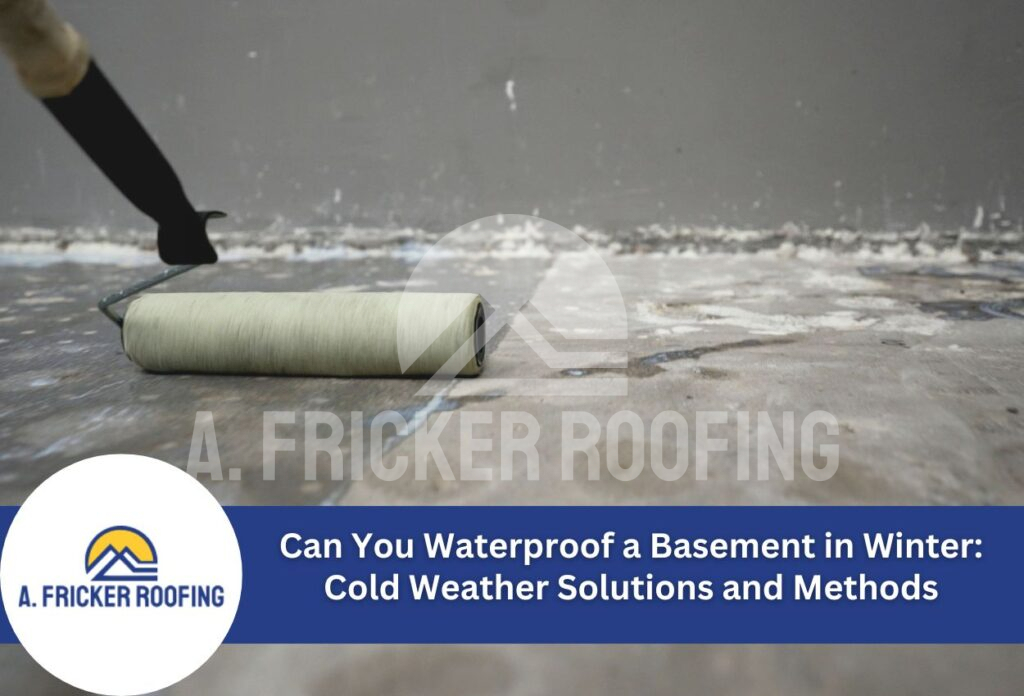Can You Waterproof a Basement in Winter: Cold Weather Solutions and Methods

Winter brings unique challenges for homeowners dealing with basement moisture problems. Cold temperatures, the frozen ground, and seasonal weather conditions create obstacles for traditional waterproofing methods. Many property owners wonder if winter basement waterproofing projects are even possible when temperatures drop and conditions become less than ideal.
The answer is yes, basement waterproofing can be accomplished during winter, though the approach requires careful planning and specific techniques. Cold-weather solutions offer viable alternatives when exterior work becomes impractical or impossible. These methods focus on managing moisture from inside the home rather than relying on outdoor excavation and exterior treatments.
Property owners facing immediate moisture issues can’t always wait for spring weather. Winter waterproofing methods include interior sealants, basement membrane systems, improved drainage solutions, and humidity control measures that work effectively regardless of outdoor temperatures. These approaches address the root causes of basement moisture while working within the constraints of cold weather conditions.
Common Winter Basement Water Problems You Need to Address
Winter weather creates distinct basement moisture problems that differ significantly from issues that show up in spring, summer, and early fall. Condensation buildup becomes a primary concern when warm indoor air meets cold basement walls and surfaces. This temperature differential causes water vapor to condense, leading to persistent dampness that can promote mold growth and structural damage.
Frozen pipes present another winter challenge for basement waterproofing systems. When temperatures plummet, water lines can freeze and burst, causing immediate flooding and water damage. Additionally, the changes in pressure from groundwater around foundations occur as soil freezes and thaws repeatedly throughout the winter, creating stress on basement walls and existing waterproofing barriers.
Recognizing early warning signs becomes essential for preventing extensive water damage during cold weather. Musty odors often indicate hidden moisture accumulation behind walls or in crawl spaces. Wall stains, particularly those appearing near the foundation or along basement walls, signal leaks that require immediate attention.
Increased humidity levels are another indicator of basement moisture problems that winter weather can make worse. Property owners should monitor humidity readings and watch for condensation on windows, pipes, and concrete surfaces.
Interior Waterproofing Solutions That Can Work in Cold Weather
Interior basement waterproofing methods provide effective solutions when exterior work becomes impossible due to frozen ground or harsh weather conditions. These approaches focus on controlling moisture from inside the basement, making them ideal winter basement waterproofing methods that deliver immediate results.
Waterproof sealants designed for cold weather offer the first line of defense against basement moisture problems that winter conditions create. These specialized products can be applied to foundation walls, floors, and joints, even when temperatures remain below freezing outside. Hydraulic cement and polyurethane-based sealants work particularly well for sealing cracks and preventing water leaks.
Interior waterproof paints and coatings provide another viable option for waterproofing basement walls in winter. Epoxy-based coatings and crystalline waterproofing compounds go into concrete surfaces to create long-lasting protection against leaks.
Interior drainage systems are the most comprehensive winter basement waterproofing methods available. French drain installation, sump pump systems, and vapor barriers can be installed regardless of outdoor weather conditions. These systems redirect water away from living spaces and provide ongoing moisture control throughout winter and beyond. Professional installation ensures proper drainage flow and prevents basement flooding during winter incidents when snow begins melting in the spring.
Best Materials and Products for Winter Basement Waterproofing
Selecting the right materials for winter waterproofing requires understanding how cold temperatures affect product performance and curing processes. Cold-weather compatible waterproofing materials are specifically formulated to maintain effectiveness when traditional products would fail or perform poorly in low temperature conditions.
Specialized polyurethane sealants excel at winter applications because they cure properly even when temperatures drop below freezing. These products remain flexible after curing, accommodating thermal expansion and contraction that occurs during temperature fluctuations. Crystalline waterproofing compounds also perform well in cold weather, as they activate when moisture is present and continue working throughout the winter to seal basement walls.
Interior basement waterproofing projects benefit from epoxy injection systems designed for low-temperature applications. These two-part systems cure reliably in controlled indoor environments and provide permanent crack repair solutions. Hydraulic cement products offer another excellent option for emergency repairs, as they set quickly regardless of outdoor temperatures and effectively stop active water leaks.
Certain materials should be avoided during winter basement waterproofing projects. Water-based sealants, standard concrete patching compounds, and latex-based coatings often fail to cure properly in cold conditions. These temperature-sensitive materials may appear to set initially, but can fail when subjected to freeze-thaw cycles. Solvent-based products and modified acrylic coatings also struggle with proper adhesion when applied during basement moisture problems, winter situations where humidity levels remain high, and temperatures stay consistently cold.
When to Call Professionals vs. DIY Winter Waterproofing
Determining whether to tackle winter basement waterproofing methods as a DIY project or hire professionals depends on the complexity and amount of moisture issues present. Structural problems, extensive water damage, and foundation cracks wider than a ¼-inch typically require professional expertise to address properly during cold weather conditions.
Simple waterproofing tasks homeowners can safely handle include applying cold-weather sealants to minor cracks, installing plastic vapor barriers, and improving ventilation systems. These DIY waterproofing methods require basic tools and materials available at hardware stores, along with proper safety equipment, like moisture-resistant gloves and adequate lighting.
Safety considerations become paramount when attempting to waterproof basement walls in winter. Homeowners should never work alone in basements with standing water or electrical concerns. Cold weather increases the risk of hypothermia when working in unheated basement areas for extended periods. Professional waterproofing contractors understand these hazards and carry insurance coverage for winter work, making them the safer choice for complex basement moisture problems that winter conditions create in structural or electrical systems.
Professional intervention becomes necessary when basement flooding involves sewage backup, electrical hazards near water sources, or foundation settlement issues. Contractors possess specialized equipment for interior basement waterproofing, including industrial dehumidifiers, concrete injection systems, and drainage installation tools that most homeowners cannot access or operate safely.
Preventing Future Winter Basement Flooding Issues
Preventing basement flooding in winter requires strategies that address moisture control throughout the year. Long-term maintenance approaches focus on creating systems that withstand seasonal temperature changes and moisture fluctuations that commonly lead to water problems that winter conditions create.
Proper ventilation systems play an important role in preventing condensation buildup that occurs when interior basement waterproofing solutions alone cannot address humidity issues. Installing exhaust fans, dehumidifiers, and ensuring adequate air circulation helps maintain moisture levels year-round. These systems work continuously to prevent the conditions that lead to mold growth and structural moisture damage.
Insulation improvements around basement walls and pipes prevent the temperature differentials that cause condensation and freezing issues. Insulating exposed water lines protects against burst pipes that create sudden flooding, while wall insulation reduces the cold surfaces where moisture condenses. These preventive measures significantly reduce the likelihood of emergency winter basement waterproofing methods becoming necessary.
Regular maintenance schedules should include monthly inspections of basement areas for early signs of leaks. Checking foundation walls for new cracks, monitoring humidity levels, and testing sump pump systems ensures problems are identified before they escalate. Annual maintenance of gutters, downspouts, and exterior drainage systems prevents water from accumulating around foundations.
Maintaining Your Waterproofed Basement Through Winter
Successful winter basement waterproofing methods require ongoing monitoring and maintenance to ensure long-term effectiveness. Regular inspection schedules become critical during winter when temperature fluctuations and moisture changes can stress waterproofing systems. Property owners should conduct weekly visual checks of basement walls, floors, and previously treated areas for signs of new moisture infiltration or system failure.
Essential maintenance tasks include monitoring humidity levels and ensuring dehumidifier systems are operating efficiently. Sump pump testing is important during winter thaw cycles when basement flooding risks increase dramatically. Testing these systems monthly prevents failures during critical periods when melting snow creates sudden increases in the volume of water around foundations.
Warning signs that indicate basement waterproofing may be failing include white mineral deposits appearing on walls, musty odors returning despite previous treatments, and condensation forming on previously dry surfaces. New water stains, peeling paint, or cracking in sealed areas signal that immediate attention is needed.
Expert Winter Basement Waterproofing with A. Fricker Roofing and Waterproofing
Winter brings unique challenges when it comes to maintaining a dry basement. The cold weather often makes existing moisture problems worse, making effective waterproofing very important. If you’re noticing signs of moisture such as damp walls, a musty smell, or increased humidity, it’s important to address these issues quickly to avoid structural damage and expensive repairs. A. Fricker Roofing and Waterproofing specializes in winter basement waterproofing solutions that protect your home regardless of the freezing temperatures outside.
Using the latest in cold-weather compatible materials and methods, we ensure your basement remains dry and safe all winter long. Don’t wait for the snow to melt to discover the extent of winter damage. Call us today at (918) 402-7167 to schedule a consultation and safeguard your home this winter.



